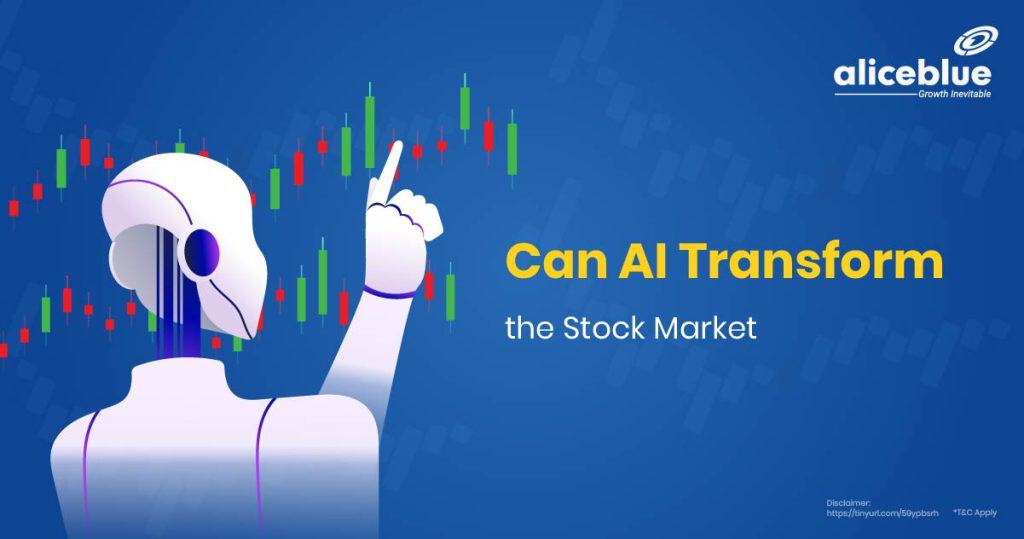AI can transform the stock market by improving trading efficiency, enhancing predictive analysis, and optimizing decision-making. It helps identify patterns, forecast trends, and automate trades. Additionally, AI-driven insights enhance risk management and portfolio optimization, revolutionizing how investors interact with financial markets.
Content:
- What Is AI Trading?
- How to use AI for Stock Trading?
- The Benefits of AI in the Stock Market
- Risks of Artificial Intelligence Trading
- Types of AI Trading Strategies
- How Is AI Transforming Stock Marketing Prediction?
- Artificial Intelligence Trading Manning- Quick Summary
- How AI Is Transforming Stock Market – FAQs
What Is AI Trading?
AI trading uses artificial intelligence to automate trading processes, analyze market data, and predict stock movements. By employing machine learning and algorithms, AI executes trades at optimal times, enhancing speed, accuracy, and profitability, while minimizing human errors in stock market investments.
AI trading enables advanced analysis by processing large datasets to identify patterns and trends that might be overlooked by human traders. This capability makes AI particularly useful for high-frequency trading and portfolio management, improving overall market efficiency.
Furthermore, AI trading systems continuously learn and adapt, improving their predictions over time. They use historical data and real-time market changes to refine strategies, enhancing long-term investment performance and reducing risks.

How to use AI for Stock Trading?
To use AI for stock trading, investors utilize tools that analyze data, generate insights, and automate decisions. AI-based platforms help forecast stock trends, optimize portfolios, and execute trades, leveraging predictive analytics to improve returns and reduce risks.
AI tools can process market news, social sentiment, and technical indicators to identify investment opportunities. Investors can use platforms offering algorithmic trading, backtesting strategies, or robo-advisory services for data-driven stock market decisions.
By integrating AI systems with brokerage accounts, traders can automate trade execution based on pre-set conditions, ensuring timely transactions. This integration enhances efficiency, reduces emotional biases, and allows seamless trading experiences.
The Benefits of AI in the Stock Market
The main benefits of AI in the stock market include enhanced trading efficiency, accurate trend predictions, and optimized portfolio management. AI automates processes, reduces human error, and provides data-driven insights, empowering investors to make informed decisions and achieve better risk-adjusted returns.
- Enhanced Trading Efficiency: AI streamlines trading processes by automating trade execution and analyzing vast datasets in real-time. This reduces delays, ensures optimal trade timing, and enhances accuracy, enabling investors to maximize profits while minimizing the impact of market volatility.
- Accurate Trend Predictions: By leveraging machine learning, AI identifies patterns and predicts stock movements with high precision. Its ability to analyze historical and real-time data helps investors anticipate market trends, providing a competitive edge in decision-making and portfolio adjustments.
- Optimized Portfolio Management: AI tools assist in creating and managing diversified portfolios by analyzing risk factors, market trends, and investment goals. This optimization ensures a balanced approach to maximize returns while maintaining suitable risk levels for investors.
- Reduced Human Errors: AI eliminates emotional biases and reduces errors caused by human judgment. By relying on data-driven insights, it ensures more consistent and objective trading decisions, enhancing reliability and long-term performance in the stock market.
- Risk Management and Insights: AI analyzes complex risk scenarios and offers insights to mitigate potential losses. It evaluates market conditions, predicts risks, and provides strategies to navigate uncertainties, ensuring better protection for investors’ capital during volatile periods.
Risks of Artificial Intelligence Trading
The main risks of artificial intelligence trading include over-reliance on algorithms, potential system failures, and susceptibility to unforeseen market conditions. AI models may misinterpret data, amplify volatility, or lead to significant losses if improperly calibrated or exposed to unpredictable market disruptions.
- Over-reliance on Algorithms: AI trading relies heavily on algorithms, which may fail to adapt to sudden market changes. Excessive dependence on automated systems can result in missed opportunities or amplified losses during unexpected economic or geopolitical events.
- System Failures and Errors: Technical glitches, software bugs, or data inaccuracies can disrupt AI systems, leading to erroneous trade executions. These failures may cause significant financial losses, especially in high-frequency trading environments where speed and precision are critical.
- Unforeseen Market Conditions: AI models struggle to predict extreme market events like sudden crashes or black swan scenarios. These conditions can render pre-trained algorithms ineffective, leading to poor decision-making and potentially devastating outcomes for traders.
- Amplified Market Volatility: AI-driven trading strategies can contribute to increased market volatility. When multiple systems act on similar signals simultaneously, it may create abrupt price swings, destabilizing the market and affecting investor confidence.
- Lack of Human Judgment: AI lacks the nuanced understanding and judgment of human traders, which can result in decisions that disregard qualitative factors like regulatory changes, corporate announcements, or political events, potentially undermining trading strategies and outcomes.
Types of AI Trading Strategies
The main types of AI trading strategies include algorithmic trading, which automates trade execution; sentiment analysis, which interprets market sentiment from news and social media; predictive analytics, which forecasts trends using historical data; and high-frequency trading, leveraging speed for market opportunities.
- Algorithmic Trading: AI automates trade execution by analyzing market data and triggering trades based on predefined rules. This strategy ensures precision, reduces human errors, and enhances efficiency in trading decisions across various financial markets.
- Sentiment Analysis: AI uses natural language processing to assess market sentiment from news articles, financial reports, and social media. By gauging public opinion, it helps traders predict market movements and make informed investment decisions.
- Predictive Analytics: AI employs machine learning to analyze historical and real-time data, identifying patterns to forecast future market trends. This strategy helps investors anticipate price movements, optimize portfolios, and adjust trading strategies for better returns.
- High-Frequency Trading (HFT): AI executes numerous trades within milliseconds by leveraging high-speed processing and algorithms. HFT strategies capitalize on minute price differences, offering quick profits but requiring robust systems to manage risks and handle intense market conditions.
How Is AI Transforming Stock Marketing Prediction?
AI is transforming stock market prediction by analyzing large datasets, identifying trends, and making accurate forecasts. Its advanced algorithms improve predictive accuracy, helping investors anticipate market movements and make informed investment decisions with greater confidence.
Machine learning models analyze historical data and real-time inputs to identify patterns, offering predictive insights. These models enhance portfolio management and risk assessment by providing actionable recommendations for future investments based on evolving market trends.
AI also incorporates alternative data sources, such as news sentiment and social media, to predict market dynamics. This multi-faceted approach allows investors to adapt to market changes quickly, optimizing returns while minimizing risks.
Artificial Intelligence Trading Manning- Quick Summary
- AI trading automates processes, analyzes market data, and predicts stock movements. Using machine learning, it enhances speed, accuracy, and profitability while minimizing errors, particularly in high-frequency trading and portfolio management.
- AI tools analyze data, forecast trends, optimize portfolios, and automate trades. Platforms offering algorithmic trading and robo-advisory enable efficient, data-driven trading while reducing emotional biases and improving investment outcomes.
- The main benefits of AI in the stock market include improved efficiency, accurate trend prediction, and optimized portfolios. AI reduces human error, automates processes, and helps investors make informed, risk-adjusted decisions.
- The main risks of AI trading include over-reliance on algorithms, system failures, and inability to handle unforeseen market events, potentially leading to amplified volatility or significant financial losses.
- The main types of AI trading strategies are algorithmic trading for automation, sentiment analysis for market perception, predictive analytics for trends, and high-frequency trading for leveraging speed in market opportunities.
- AI analyzes datasets to predict trends, offering actionable insights for portfolio management. It uses machine learning and sentiment analysis, incorporating alternative data sources for real-time market adaptation and optimized returns.
- Open a free demat account with Alice Blue in 15 minutes today! Invest in Stocks, Mutual Funds, Bonds & IPOs for Free. Also, trade at just ₹ 20/order brokerage on every order.

How AI Is Transforming Stock Market – FAQs
Artificial Intelligence Trading uses AI algorithms to automate trading processes, analyze vast datasets, and identify patterns for predicting stock market trends. It optimizes trade execution, enhances accuracy, and reduces human errors in financial decision-making.
AI in stocks analyzes historical data, real-time trends, and market sentiment to predict price movements. It powers algorithmic trading, portfolio optimization, and risk management, helping investors make data-driven decisions and improve investment outcomes.
AI will transform the stock market by automating trades, enhancing predictive analytics, and improving efficiency. It reduces emotional biases, provides actionable insights, and fosters innovation, but also raises concerns about market volatility and over-reliance on technology.
AI can analyze the stock market by processing large datasets, identifying trends, and offering predictions. It uses machine learning and sentiment analysis to interpret market signals, enabling investors to make informed decisions with improved accuracy.
Yes, you can use AI for stock trading through platforms offering algorithmic trading, predictive tools, and robo-advisory services. These systems automate trade execution, provide insights, and optimize strategies for better returns and risk management.
AI may replace some trading functions but not entirely eliminate stock traders. Human judgment is still crucial for interpreting complex factors like policy changes, geopolitical risks, and market dynamics, ensuring a balance between automation and human expertise.
Yes, using AI for stocks is legal, provided it complies with financial regulations. Investors must ensure transparency, avoid market manipulation, and adhere to guidelines set by regulatory authorities like SEBI, SEC, or similar governing bodies.
Disclaimer: The above article is written for educational purposes and the companies’ data mentioned in the article may change with respect to time. The securities quoted are exemplary and are not recommendatory.









